Spotlight Series Programme 2021
Day 1 - Wednesday 26th May
10.00 – 10.30 – Welcome and Introduction
First, hear from Per Saxegaard, Founder of Business for Peace about the 2020 Business for Peace Honourees and their work towards SDG8: Decent Work and Economic Growth. There will also be a special virtual recognition to name them as official Business for Peace Honourees. Next up, we will hear welcoming remarks that inspire the #businessworthy cause from Governing Mayor of Oslo, Raymond Johansen. Then our Managing Director of Business for Peace, Marius Døcker, will open our three-day Spotlight event series focused on Decent Work.
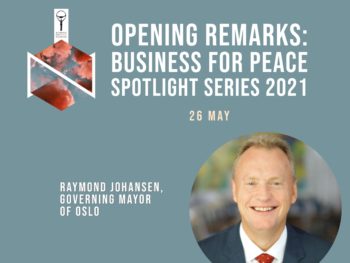
10.45 – 12.00 – Rethinking Systems of Decent Work
The socio-economic consequences of the COVID-19 have been severe, exposing existing vulnerabilities and exacerbating inequalities on a global scale. Those with unstable incomes and little-to-no social protections have been pushed deeper into poverty. Women around the world have been left more vulnerable to job and income losses and are at higher risk of experiencing domestic violence and abuse. School disruption and the disappearance of entry level jobs, internships, and job training programmes have marginalised youth and left them with an uncertain future.
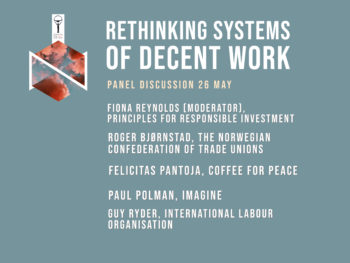
As the world rebuilds in the wake of the coronavirus pandemic, hear from leading voices on how governments, private sector actors, unions, and civil society organisations can unite to overcome challenges and re-establish better systems for decent work.
Speakers:
Moderator – Fiona Reynolds, CEO, Principles for Responsible Investment
Paul Polman, Co-founder and Chair at IMAGINE
Guy Ryder, Director General, International Labour Organisation
Felicitas Pantoja, CEO & Founder, Coffee for Peace
Roger Bjørnstad, Chief Economist, The Norwegian Confederation of Trade Unions (LO)
15.00 – 16.00 – Stakeholder Capitalism in the Post-Pandemic World: Conversation with Joseph Stiglitz
The current pandemic has shone a light on the importance of stakeholder capitalism and the difference between how our economies have worked in the past versus how we need them to work going forward. The actions of companies toward their stakeholders has come under additional scrutiny. While many companies have prioritised employee safety, community protection, and customer safety, others have only focused on their bottom-lines.
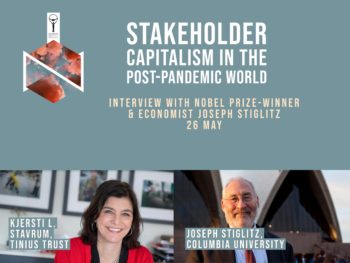
Research has shown that serving all stakeholders is an ethical good that can be a source of competitive advantage, however, the businessworthy concept remains an ideal rather than an operational goal for many.
Speakers:
Joseph E. Stiglitz, Nobel-Prize winning Economist and Professor at Columbia University
Kjersti Løken Stavrum, CEO at Tinius Trust and President of PEN Norway
View “Stakeholder Capitalism in the Post-Pandemic World” here
17.00 – 18.00 – Building Resilient Supply Chains
One of the biggest contributing factors to modern day slavery is a lack of supply chain visibility. According to the new Economist Intelligence Unit research report, over half of companies lack end-to-end visibility of their supply chains because they rely on a picture of supply and demand that is based only on internal data. As a result, the majority of companies are unaware of unethical or slavery practices that are occurring within their supply chains. In the process of building back better, the supply chain ethos needs to be transformed from efficiency and low-cost country sourcing, to supply chain resilience and visibility.
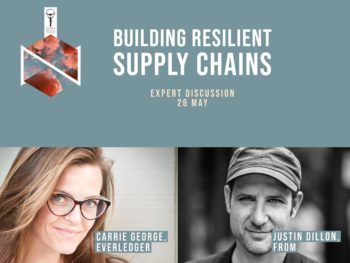
Speakers:
Carrie George, VP Sustainability and Impact, Everledger
Justin Dillon, Founder of FRDM, an enterprise-grade software company
Day 2 - Thursday 27th May
09.30 – 11.30 – Inspiring Youth Inclusion and Participation
Access to decent, productive work benefits everyone and paves the way for more prosperous societies. With the right policies in place, young people can be influential actors of economic and social progress. But if we fail to improve their prospects, especially for those the most disadvantaged, both economic and social development could be compromised locally and globally. Join us for our Youth Workshop to explore how stakeholders can ensure youths are included in high-level decision-making processes and make positive change within their communities.
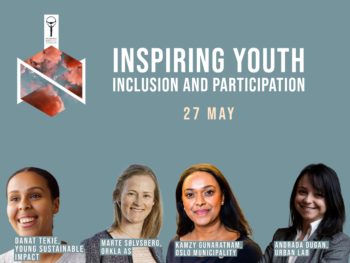
Speakers:
Moderator – Andrada Dugan, Head of Urban Lab, Incubation and Open Innovation, Paris & Co
Danat Tekie, Co-Founder & Chief External Relations Officer, YSI
Kamzy Gunaratnam, Deputy Mayor of Oslo, City of Oslo
Marte Sølvsberg, Business advisor to President, Orkla AS
13.00 – 14.00 – The Hidden Workforce
Prior to the pandemic, a portion of the global population already within the “hidden workforce” struggled to find stable employment with decent working conditions. According to the Harvard Business Review, the hidden workforce includes individuals with employable skills who are unable to make it into the workforce, for example, immigrants and refugees, the formerly incarcerated, veterans, seniors, caregivers, and people with disabilities. These groups have been largely neglected in government policies and business hiring practices.
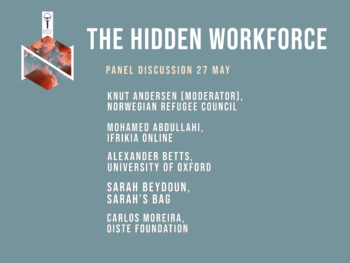
Without social safety nets, they have been pushed deeper into poverty and social exclusion due to the challenges presented by the current pandemic. We’ll be joined by an expert panel including a CEO employing underserved women in Lebanon, a pioneer in the field of digital identity and a leading voice in the academic community.
Join this event for a lively talk on the process of rebuilding, stakeholders need to generate sustainable solutions to remove barriers that marginalize hidden workers and create meaningful space for them in the labour market.
Speakers:
Moderator – Knut Andersen, Global Livelihoods Manager, Norwegian Refugee Council
Alexander Betts, Professor of Forced Migration and International Affairs at the University of Oxford
Carlos Moreira, Secretary-General of the OISTE Foundation
Sarah Beydoun, CEO & Co-founder, Sarah’s Bags
Mohamed Abdullahi, Somali-Translator, Proofreader & Web researcher, Ifrika Online
15.00 – 16.00 – Role of Governments and Businesses in Building Back Better
The pandemic has highlighted the vulnerabilities within our social and economic systems, particularly our misguided focus on short-term economic growth and efficiency over long-term resilience and sustainability. In building back better, we need to commit to designing economic systems that reduce socio-economic inequalities and tackle global environmental emergencies such as climate change and biodiversity loss. Environmentally destructive activities and unsustainable structures that prevent upward social mobility can no longer be the norm, as we are faced with the opportunity to rebuild more resilient, sustainable, and inclusive societies.
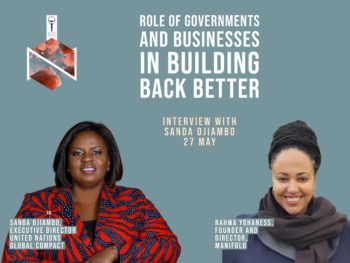
Join us for this one-on-one interview with Sanda Ojiambo, Executive Director of the United Nations Global Compact as we discuss how governments and businesses can work together to design recovery policies anchored in the Sustainable Development Goals.
Speakers:
Sanda Ojiambo, Executive Director, United Nations Global Compact
Moderator – Rahwa Yohaness, Founder and Director, Manifold
View “Role of Governments and Businesses in Building Back Better” here
Day 3 - Friday 28th May
10.00 – 10.45 – Ensuring Financial Services for All: Leading Financial Inclusion with Dr. James Mwangi
This interview will focus on understanding the inequalities and challenges faced by unbanked populations and their opportunities for broader economic participation. During this intimate conversation, Dr James Mwangi will reflect on his career championing financial inclusion, and will discuss the role of the financial sector in meeting the SDG Agenda. As a 2020 Business for Peace Honouree, Dr Mwangi will join us in conversation to spotlight his decades-long commitment to inclusive initiatives and his business philosophy to ensure financial services for all.
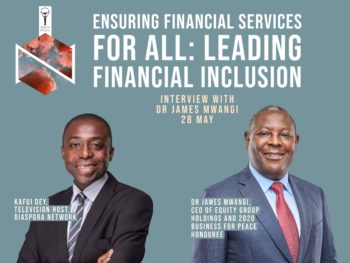
Dr. Mwangi is a leading example of a business leader working towards SDG Target 8: “Universal access to banking, insurance and financial services.” In this interview, we will cover his continuous commitment to broadening banking to marginalised communities in the Global South and hear about what the future holds for inclusive banking.
Speakers:
Dr James Mwangi, CEO of Equity Group Holdings
Kafui Dey, Television host at Diaspora Network
11.30 – 12.45 – Sustainable Investing: The SDG Impact Standards in Focus
In every corner of the globe, the private sector is increasingly seeking new opportunities to make a positive impact – and to make meaningful contributions towards the achievement of the SDGs. However, many are lacking concrete guidance on how to translate intent to action – a longstanding missing link. To this end, the new UNDP SDG Impact Standards for private equity funds are a practical contribution providing a common language and a clear system for integrating the SDGs into business and investment decision-making.
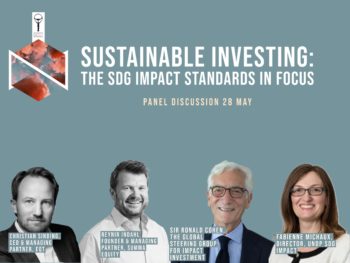
In this two-part session, UNDP SDG Impact will present the new SDG Impact Standards for Private Equity Funds. Following this overview, Fabienne Michaux, Director of SDG Impact, will lead a dialogue with pivotal voices from the private equity sector. In this thought-provoking discussion, key Nordic and global investors will give their professional insights into the inputs and needs of the financial sector to implement the Standards and create measurable impact to meet the 2030 Agenda.
Speakers:
Moderator: Fabienne Michaux, Director, UNDP SDG Impact
Reynir Indahl, Managing Partner, Summa Equity
Christian Sinding, CEO and Managing Partner, EQT
Sir Ronald Cohen, The Global Steering Group for Impact Investment
View “Sustainable Investing: The SDG Impact Standards in Focus” here
14.00 – 15.00 Scaling Sustainable Finance and Economic Growth and Keynote Address by Amina Mohammed
If we are to close the financial gap towards the achievement of the SDGs, now is the time to act, align and harmonise our organisational efforts to scale sustainable finance. Leading global corporate actors agree, in order to finance the SDGs while creating sustainable economic growth (SDG 8) we need urgent action to catalyse private finance. In this panel, Idar Kreutzer, CEO of Finance Norway, will host a deep dive into purposeful corporate governance with Fani Titi, CEO of Investec, and Carine Smith Ihenacho, Chief Governance and Compliance Officer of Norges Bank Investment Management.
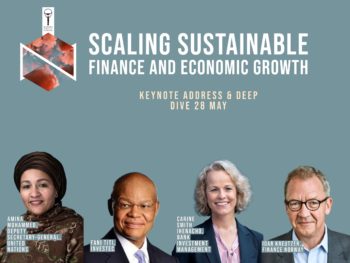
Measuring and reporting impact is crucial. In this conversation, our speakers will discuss how their organisations address the most enduring challenges to accelerating sustainable finance. In order to transform corporate sustainability, a larger conversation must be had to cover the collective actions needed to harmonise and collaborate between a multitude of stakeholders.
Speakers:
Amina Mohammed, Deputy Secretary-General of the United Nations and Chair of the United Nations Sustainable Development Group
Moderator – Idar Kreutzer, CEO, Finance Norway
Fani Titi, CEO, Investec
Carine Smith Ihenacho, Chief Governance and Compliance Officer, Norges Bank Investment Management
15.30 – 16.15 – Roundtable: Making Blended Finance Work for the SDGs
Development finance actors today need private capital to mobilise action towards sustainable development. One approach to achieve this is blended finance, but scaling private and commercial investment towards the SDGs isn’t happening fast enough. In order to breach the estimated 2.5 trillion dollar investment gap in the SDGs in developing countries, we must make better use of blended finance mechanisms. As a flexible approach, blended finance allows organisations with different objectives to invest alongside each other while achieving their own objectives.
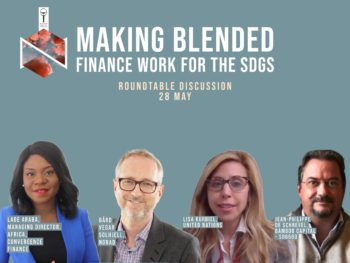
To explore the roadblocks inhibiting comprehensive, blended finance initiatives and discuss solutions, this roundtable will engage leading contributors from the public and private financial sector. What does the private sector need in order to commit funds at scale, and what must donors and governments put in place to make blended finance programming more attractive for private investors? Join us to understand how public-private partnerships could create a new era of blended finance for the SDGs.
Speakers:
Moderator – Ladé Araba, Managing Director, Africa at Convergence Finance
Jean-Philippe de Schrevel, Founder & Managing Partner Bamboo Capital – SDG500
Bård Vegar Solhjell, Director General, NORAD
Lisa Kurbiel, Head of the Joint SDG Fund Secretariat, United Nations



